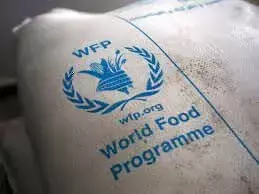WFP launches $2.5bn Nigeria hunger, malnutrition intervention fund
Stevenson said the CSP was designed to support Nigeria in achieving food security and improved nutrition by 2030, in line with the Sustainable Development Goals (SDG 2).;

The United Nations World Food Programme (WFP) on Wednesday unveiled a Country Strategic Plan (CSP) for Nigeria worth $2.5 billion.
The CSP is aimed at addressing hunger and malnutrition in some parts of North East, North West and other selected States.
The WFP Country Director, David Stevenson disclosed this at a joint press conference with the Ministry of Humanitarian Affairs, Disaster Management and Social Development,
Stevenson explained that CSP defines WFP’s entire portfolio of assistance within the country for a period of five years, effective 2023 to 2027.
“The country strategy is valued at $2.56 billion and it’s more than $500 million a year assistance for Nigeria to achieve food security and improve nutrition by 2030”, he said.
He said the CSP was designed to support Nigeria in achieving food security and improved nutrition by 2030, in line with the Sustainable Development Goals (SDG 2).
He also said that the CSP would contribute to progress in good health and wellbeing, inclusive education, gender equality and climate action as well as foster a reinforced partnership in strengthening the national humanitarian and development response in accordance with the SDGs.
“My job as country representative in Nigeria, is effectively running a big business, a business that is valued at about $1 million every day of assistance.
“And we are signing contracts with Nigerian companies, with Nigerian Civil Societies everyday, to get the food assistance to where t’s needed.”
He further said that the WFP operates a food system that sees conflict as the enemy of progress, adding that WFP was making significant investment in Nigerian economy by buying and investing locally.
“This is a new WFP investing in the Nigerian economy, meeting the needs of Nigerians and contributing to agricultural, productive food systems solutions.”
The Country Director added that the WFP would support the government in life saving Crisis Response assistance, and life changing resilience building activities through technical assistance and policy.
He said this would to help maximise the return on government investment in food security and nutrition.
“All of this is aligned with Nigeria’s national development plan, with the Nigeria agenda 2050.
“The National multi sectoral plan of action for food and nutrition in Nigeria and then Nigeria’s national humanitarian development peace framework”, he added.
Meanwhile, Dr Nasir Sani-Gwarzo, Permanent Secretary, Ministry of Humanitarian Affairs, Disaster Management and Social Development, described the partnership between the Ministry and WFP as cordial.
He added that it had achieved several milestones in the humanitarian space.
“To be specific, the stabilisation fund project was implemented in six Local Government Areas (LGAs) in the North East and North West with a total of 27, 432 persons impacted across the selected LGAs”, he said.
However, while presenting the Summary of the CSP, the Head of Programme WFP, Mr Serigne Loum, said they would work on the humanitarian-development-peace nexus to address challenges posed by the deteriorating food and nutrition situation.
He said this approach would be achieved through gender transformative, nutrition mainstreaming, climate smart and conflict sensitive approaches.
Loum said WFP Nigeria covers the North East, North West and states hosting Cameroonian refugees with a total budget of $2.5 billion for five years.
The News Agency of Nigeria (NAN) reports that states to benefit are Borno, Yobe, Taraba and Adamawa in North East, Sokoto, Zamfara and Katsina in the North West, as well as Cross River.

